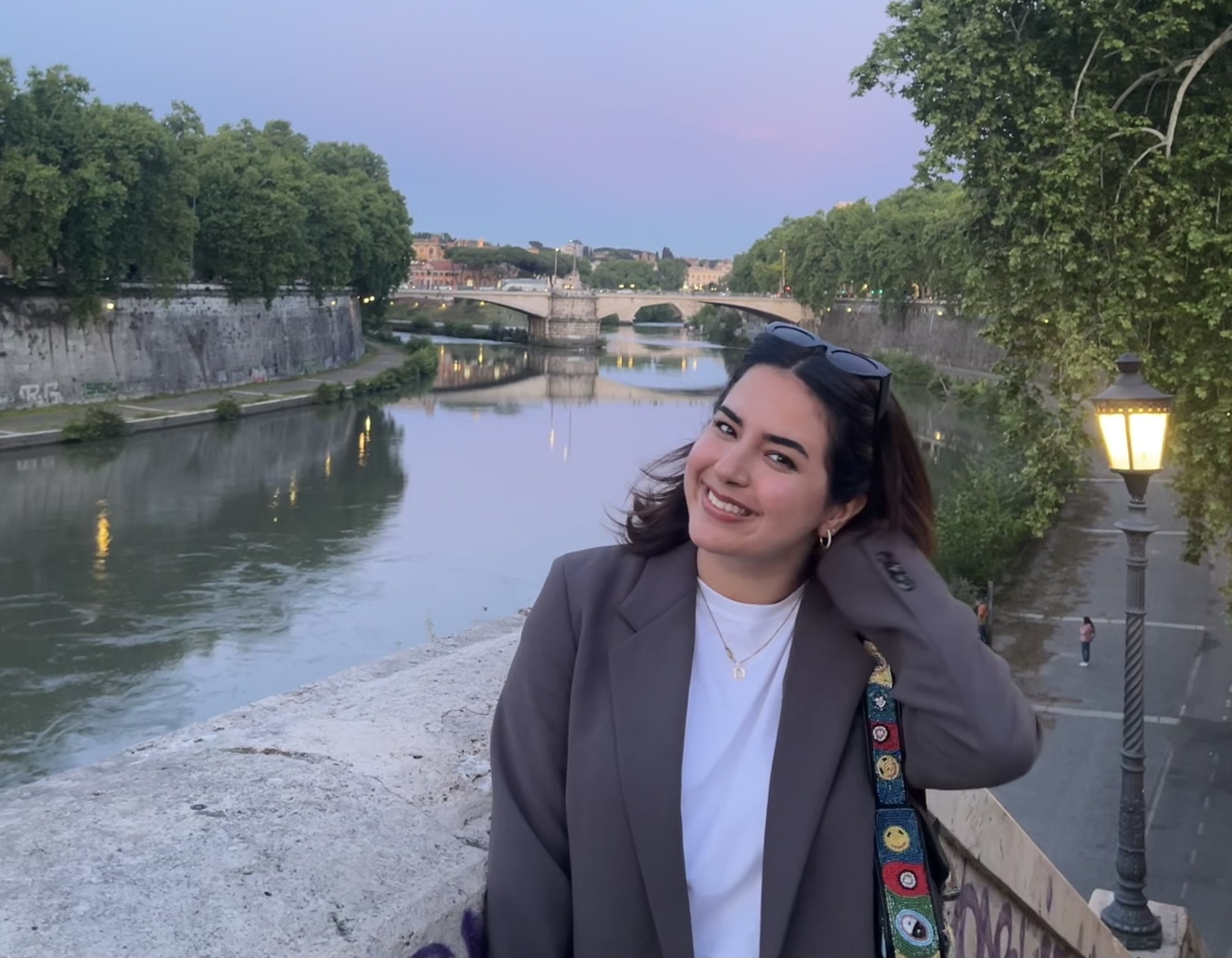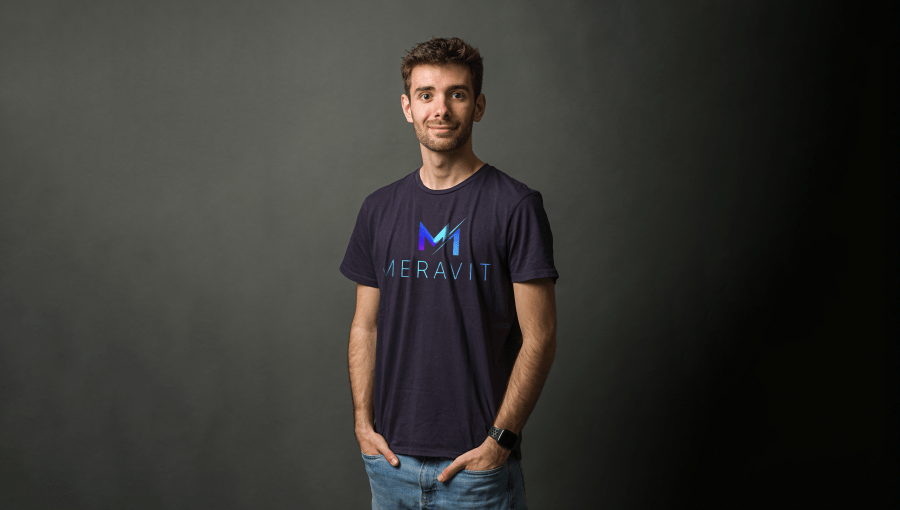The Power of Connection: Meet Alumna Danah Alkhafaji
Danah Alkhafaji is an Arab American alumna who graduated from JCU in 2024 with a B.A. in Humanistic Studies and a minor in Philosophy. She was recently accepted to the London School of Economics (LSE), where she will pursue an M.A. in Human Rights and Politics. While she was a student at JCU, Danah founded the Arab Student Association (ASA).
Tell us about your background. How did you choose to study at JCU and pursue a BA with a major in Humanistic Studies and a minor in Philosophy?
I am half Saudi and half Iraqi, but I was born in Washington D.C. After spending the first year of my life in the States, I was raised between Switzerland and Jordan. Eventually, I returned to the D.C. area for high school.

I learned about JCU after being unsatisfied with my experience at a state school in Virginia. I knew that I wanted the opportunity to live abroad again, to enjoy smaller class sizes where I could really get to know my professors, and most importantly, to pursue a more interdisciplinary degree. JCU checked all of these boxes for me, especially in terms of academics. What I found so special about Humanistic Studies was the possibility to explore numerous disciplines. As a humanities major, I had the chance to take courses pertaining to art history, classics, history, philosophy, English, and more. Thus, I feel I graduated from JCU as a truly well-rounded student. My minor in Philosophy resulted from a genuine interest in philosophical discussions, ranging from ancient philosophy to digital humanities.
You have been accepted to LSE for your graduate studies. Why did you choose to specialize in Human Rights and Politics?
My choice of human rights for my graduate studies came to me quite unexpectedly. During my senior year at JCU, I took an elective course with Professor Pamela Harris about human rights and law. I found the topic intriguing; however, I was hesitant about delving into political science as a humanities major, fearing that it would be out of my comfort zone. The course ended up being one of my favorite classroom experiences from my time at JCU. Not only did I find the curriculum fascinating and introspective, but I also quickly realized how much my background in philosophy helped me within the human rights debate. I found myself passionately defending the need for universal human rights, being equipped with moral arguments from my experience with philosophical discourse.
My interest in human rights is also personal. I grew up hearing stories from my grandparents about the Armenian genocide and the destruction their own parents witnessed, saw the results of the Syrian civil war and the subsequent refugee crisis firsthand while living in Amman, and was enrolled in Professor Harris’ class during the time of humanitarian crisis in Gaza following October 7th, 2023. Because of my relationship with these conflicts, when it came to applying for graduate school, I looked mainly for human rights programs. I knew I wanted to pursue a path that would allow me to explore the moral and ethical repercussions of these conflicts, while attempting to ensure a future where they cease to occur.
What do you believe is the role of humanistic studies and philosophy in today’s technology-led world?
The main way in which philosophy can be applied to today’s world is through digital humanities, which are more prevalent now than ever before because of the rise of artificial intelligence. I consider humanities, and more specifically philosophy, to be important because it offers a moral and ethical compass to guide us through a rapidly advancing society. As these technological developments take place, I think philosophy needs to be at the forefront of public discourse in order to ensure they are being used for the greater good of society. The ethical use of AI and its impact on the climate are among the many discussions that could benefit from a humanistic perspective. Guaranteeing that technological advances are both beneficial and ethical is fundamental to a just and fair society.
How and why did you decide to found the Arab Student Association? What did you learn from it?
The Arab Student Association is the project that I am most proud of from my time at JCU. I knew that I wanted to create a sense of community for Arab and Muslim students on campus. I found the need for community especially important because, as someone who grew up living in the diaspora, I never felt like I fit in with Arabs, nor did I feel at home with Americans. Since I felt like I was too Arab for Americans and too American for Arabs, the idea for ASA remained at the forefront of my mind.
I understand the fundamental importance of community, however, I also wanted to create a space where discussions that gave voice to Arab and Muslim students could take place. Once I founded ASA, my role as president allowed me to bring these ideas to life. From “Living in the Diaspora” roundtables to galleries showcasing women artists of the region, to conversations with the administration regarding responses to the destruction in Gaza, I saw a true space for Arab and Muslim students take shape.
Through the birth of ASA, a tremendous amount of connection occurred between members of the club, but also outside of it. ASA grew to be a highly collaborative club due to its foundation of community, which is my biggest takeaway from the experience. Founding and leading ASA for two years showcased the importance of mutual support. Leading a board full of strong women to advocate for the needs of Arab and Muslim students was a highly fulfilling use of my time and has undoubtedly influenced my desire to further pursue advocacy work.
Tell us about your experience as an undergraduate student at JCU. Was there a class or professor that particularly challenged and impacted you? What was your favorite experience in the four years you spent at JCU? What did you learn outside of your academic curriculum?
I knew very little about what my future would look like when I started at JCU. I didn’t particularly enjoy academics in high school because I never felt intrigued or interested in the subjects I was studying. During my first semester at JCU, I enrolled in Professor Tom Bailey’s Introduction to Philosophy class, which completely changed the trajectory of my academic career. It was under Professor Bailey’s guidance and support that I flourished as a student. In the span of my first semester, I went from being an extremely quiet and timid student to one increasingly confident in my academic abilities, and vocal in the classroom. Through this course, I started my first research assistantship with Professor Bailey exploring gender and intersectionality, choosing to focus on the weaponization of Queer Palestinian identity by Israeli intelligence. Professor Bailey undoubtedly allowed me to further realize my passion for philosophy.
The Humanities department offered me another extremely supportive mentor through Professor Annette Bryson, who eventually became my first thesis reader. It was through advisors such as Professor Bryson and Professor Bailey that I was granted opportunities to evolve as a student in and out of the classroom. Both encouraged my interests through research assistantships and independent studies and supported me by attending events I led for ASA. The fact that I was appreciated by faculty as an individual and not just as a name on a sheet of paper was fundamental to my growth and success at JCU. To be supported through all my endeavors, both academic and extracurricular, is something truly unique to institutions such as John Cabot University. This unwavering support and belief in me is something I am eternally grateful for, and undoubtedly has become one of my most meaningful memories.
What are your plans for the future?
I will be busy with my master’s degree starting this fall. I’m looking forward to expanding my knowledge of human rights. I hope to expand on the undergraduate research I did on shame as a tool for oppression.
Following my master’s, I hope to pursue advocacy work within international organizations, especially pertaining to identity politics and conflict resolution in the Middle East and North Africa. I’m interested in looking at the ways in which war and conflict impact identity groups and cultures. I feel the human aspect of human rights has been grossly undervalued, and I would like to bring people back to the forefront of political discussions, instead of governments, institutions, or monetary considerations.
Eventually, I hope to become a professor. The professors I had during my time at JCU are the very reason I continue to pursue academia, and also why I believe in myself as a student. I hope that I can do the same for my own students one day.
Is there any advice you would like to give to prospective students? Also, what would you say to those considering an academic path in your field?
I have two big pieces of advice: lean on your professors for support and believe in yourself! JCU is such a wonderful place because it is such a tight-knit community. The small student body allows professors to truly get to know their students, and vice versa. The History and Humanities department is an environment where support for students has been built into its very foundation.
All the good that came out of my experience at JCU resulted from taking chances based upon a belief in myself as a leader and as a student. The best thing you can do for yourself is believe that you have something important to say, that you bring something to the table, and that you provide something unique to the community.





